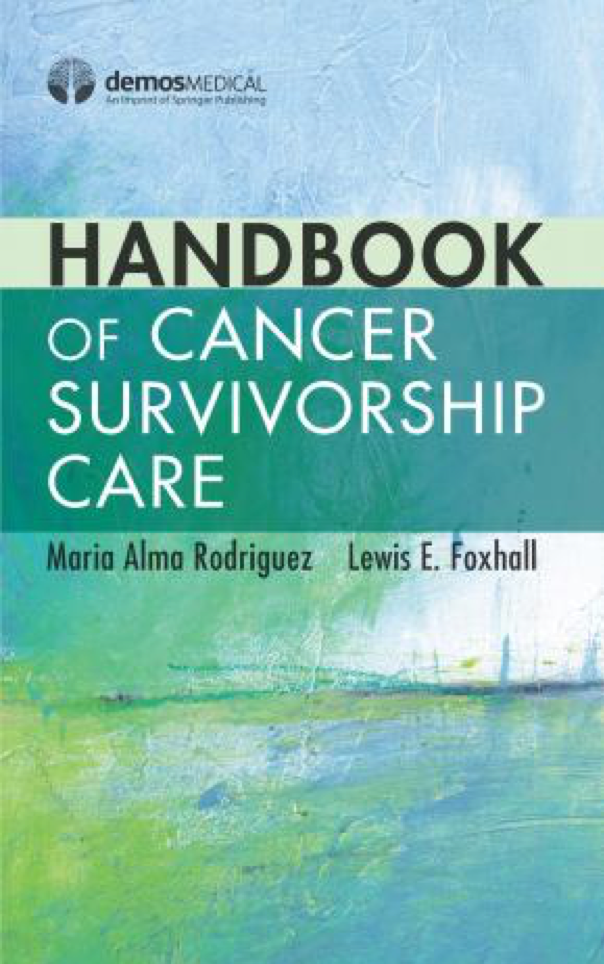 BY Victor S. Sierpina, MD, ABFM, ABIHM, Director, Medical Student Education Program, WD and Laura Nell Nicholson Family Professor of Integrative Medicine, Professor, Family Medicine University of Texas Distinguished Teaching Professor
BY Victor S. Sierpina, MD, ABFM, ABIHM, Director, Medical Student Education Program, WD and Laura Nell Nicholson Family Professor of Integrative Medicine, Professor, Family Medicine University of Texas Distinguished Teaching Professor
An excellent resource has just become available to answer that tough question. With more than 15 million cancer survivors in our country, those of us in primary care as well as in oncology have long needed guidance as to evidence-based methods to guide our cancer survivors.
This resource, Handbook of Cancer Survivorship Care by Drs. Maria Alma Rodriguez and Lewis E. Foxhall from MD Anderson, was recently released by Springer Publishing, 2019 (ISBN 97808261338194).
As you might guess, I was most intrigued by the chapter on Integrative Medicine in Survivorship Care by Dr. Gabriel Lopez, Wenli Liu, Alejandro Chaoul, M. Kay Garcia, and Lorenzo Cohen. This chapter is appropriately placed at the center of the book in terms of chapters as its principles and practices extend to all types of cancers and survivors. It follows Part I on General Principles of Survivorship Care which includes definitions, tools and resources, discussion of late and long- term effect in cancer survivors, psychosocial issues, screening and prevention strategies, the older adult cancer survivor and late-term effect of cancer therapy on older adult survivors.
This introductory section is robust, holistic, and covers core and essential issues of survivorship. Dr. Foxhall, co-author, is a well-known world leader in cancer survivorship and has worked with our UTMB program utilizing a Cancer Prevention and Research Institute of Texas (CPRIT) grant to train our residents and faculty of core principles and processes of survivorship care.
Management of site-specific cancers is the realm of Part II. It starts with the Integrative Medicine chapter to which we will return shortly. The topic areas are rich with information, pathways, evidence, algorithms, specific clinical and physical assessments, diagnostics, lifestyle recommendations, monitoring for side effects of treatment, secondary tumors, and more. The chapters cover survivors of childhood cancer, breast cancer, colorectal cancer survivors, as well as those surviving colorectal, prostate, head and neck, lymphoma, thyroid cancers and include a critical chapter for recipients of hematopoietic stem cell transplantation.
Back to the Integrative Medicine chapter, it leads off appropriately with definitions:
Integrative Medicine is an approach to patient care that blends complementary health methods and lifestyle medicine with conventional medicine in a deliberate manner that is personalized, evidence informed, and safe.
Alternative medicine refers to use of nonconventional approaches in place of conventional medicine.
Complementary medicine refers to the use of nonconventional approaches together with conventional medicine.
Integrative oncology refers to the application of integrative medicine to the care of patients with cancer and their caregivers.
It turns out a majority, of the 38% Americans who use complementary care, 68% have cancer reflecting high usage in this group. Reasons cancer patient and survivors give for the use of these therapies are: “to experience relief of cancer or cancer treatment-related side effects and better quality of life; they hope these approaches can improve treatment outcomes and decrease recurrence risk, support the immune system, and treat other chronic health conditions.”
The rational use of these therapies requires a consultation that is both open, informative, and interactive. This establishes a basis of trust and allows the patient and practitioner to reach understanding of the benefits, risks, interactions, costs of various complementary and integrative therapies. This is important as it is often the case that patients may not disclose CIM therapies with their health care team and these may interact with or decrease efficacy of therapy.
The Integrative Oncology consultation includes:
Physical
Exercise
Nutrition
Acupuncture
Oncology Massage
Includes the Primary Oncology Team, Physical Medicine and Rehabilitation, Supportive Care, Cancer Pain management
Mind-Body
Health Psychology
Meditation
Music Therapy
Tai Chi/QiGong
Yoga
Psychiatry
Spiritual Care
Social
Group Programs
Social Work
Support Groups
The ongoing integrative oncology care process helps guide patients safely through evidence-based mind-body therapies, natural products, herbs, and supplement usage, appropriate use of oncology massage, acupuncture, and other methods. Any therapies must be reviewed and if necessary modified in the face high-risk conditions such a thrombocytopenia, fever, neutropenia, metastasis, fractures, recent surgery, edema, blood clots, fall risk, mental status changes, and others.
The authors present the MD Anderson protocol for Integrative Oncology assessment and treatment in a concise, reasonable way and one which most physicians caring for cancer patients could adopt.
Overall, this is a very well composed book on Cancer Survivorship Care and is recommended reading for not only oncology specialists, but importantly for those in primary care fields such as family medicine, internal medicine, and pediatrics who see and manage the whole person who has survived cancer.


